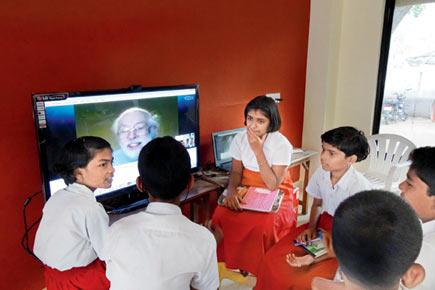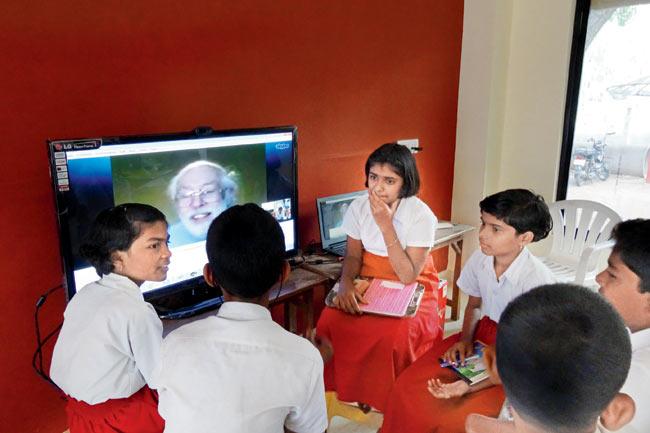Professor Sugata Mitra’s TED prize-winning School in the Cloud has been introduced in Phaltan, a small town near Pune. The children at Pragat Shikshan Sanstha are given access to computers and encouraged to self-learn more than they would in a traditional classroom

In February 2013, at the official TED conference in Long Beach, California, Professor Sugata Mitra, talking of the future of learning, dubbed the current educational system obsolete. He wasn’t the first or the only one to make the pronouncement during a TED talk, but Mitra came armed with a plan.
ADVERTISEMENT

Students at a school in the historical city of Phaltan near Pune use the state’s first SinC lab
The ebullient education researcher dreamed of creating a School in the Cloud (SinC), which gave children access to information and mentoring online and allowed them to embark on “intellectual adventures” of their own. A year and a half down the line, thanks to the $1 million TED prize Mitra won in 2013, Mitra and his team of researchers, co-ordinators, mentors and volunteers have managed to set up seven such SinC labs.
Stimulating curiosity
With two SinC labs in the UK, the rest are mainly in rural West Bengal. “Each location is different from the other. The most remote one is at Korakati in West Bengal. However, the best resourced one in the UK has children facing other issues, such as broken homes,” explains Dr Suneeta Kulkarni, research director for School in the Cloud.
Earlier this month, the historical city of Phaltan near Pune became home to the state’s first SinC lab. Here, the SinC sessions are part of the children’s school schedule. “While it is important that children learn to use computers and solve problems on their own, the question of school curriculum also arises especially in the case of the higher classes,” points out Kulkarni.
A separate classroom was constructed with the active involvement of the schoolchildren in the progressive school Pragat Shikshan Sanstha (PSS). The lab, equipped with six computers, has been designed to fit about 35 children — the size of an entire class.
Asking the right questions
Mitra’s experimentation with computers and education began with the Hole in the Wall project in 1999. He installed an Internet-connected PC in the wall of a Delhi slum and quietly observed, with the help of a hidden camera, how children taught themselves to use it. Mitra replicated this across various communities and settings and found similar, positive results.
The concept of SinC takes this a step further. The idea is to stimulate a Self Organised Learning Environment (SOLE), where the teacher’s role is limited to that of asking a ‘big question’. “It is challenging to come up with the right ‘big question’,” admits Kulkarni. The question must create a sense of wonder and curiosity, inspiring enough for the children to look for answers on their own. “We encourage the co-ordinators across the world to share their questions. It is also important to note the varying level of questions. For instance, a younger child could be asked to find out the longest river in the world. Although it seems like a straightforward question, it is quite controversial thanks to differing opinions,” says Kulkarni. At the end of each session, the children are made to present their findings. “Not all of them get the same answers, but this way they learn to question and discern between right and wrong information too,” she adds.
What Granny says
The other important aspect of the SinC is the Granny Cloud, something Mitra introduced as a separate experiment years ago. “Granny Cloud began as a way to enable children, who were taught in regional languages, to learn English in the most natural way,” explains Kulkarni. Currently the Granny network is about 100 active volunteers strong. “It is not gender, location or age specific. Our youngest Granny is 24 years old,” she adds.
Mitra and his team soon realised that the Granny Cloud had far more potential than being just a medium to learn English. “The volunteers come from diverse cultural backgrounds and the cultural exchange is perhaps one of the biggest benefits of the Skype sessions,” believes Kulkarni.
In the SinC lab, the Grannies can act like mentors who help the children when they are stuck with a problem. “We are hoping to increase our network of Grannies. We are going to need at least 350 such volunteers,” reveals Kulkarni. Inviting entries for volunteers, she adds the only necessary qualifications are that they are adaptable, have a sense of humour, a high frustration tolerance level and feel comfortable with technology.
 Subscribe today by clicking the link and stay updated with the latest news!" Click here!
Subscribe today by clicking the link and stay updated with the latest news!" Click here!






